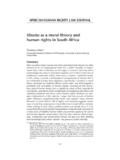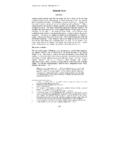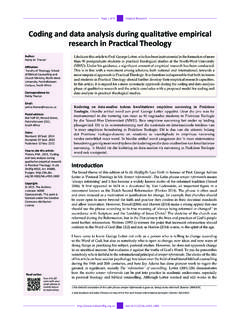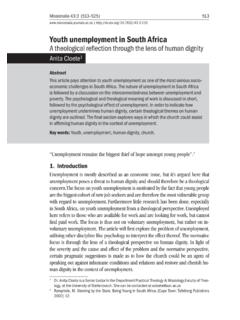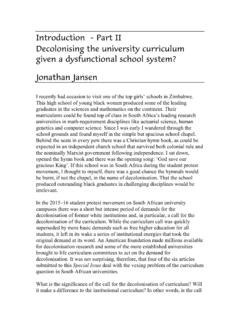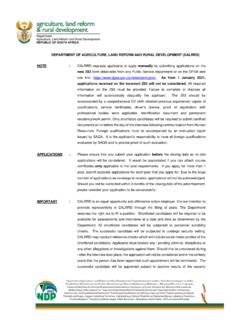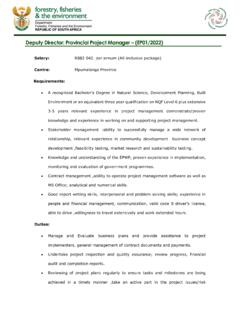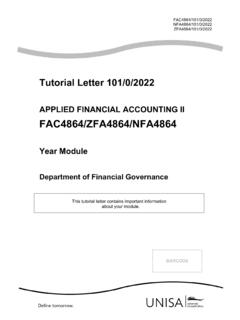Transcription of Article Dynamics of Decoloniality in South Africa: A ...
1 Article Dynamics of Decoloniality in South Africa: A Critique of the History of Swiss Mission Education for Indigenous People Johannes Seroto University of South Africa Abstract This paper presents a new framework to analyse missionary education in South Africa, using Grosfoguel's conceptual and methodological lens of coloniality of power, coloniality of knowledge, and coloniality of being. Firstly, the paper introduces the theoretical lens that undergirds this study and describes the three above-mentioned dimensions. Rather than seek generalisations concerning missionary education in the historical record, the paper presents an analysis of the endeavours of the Swiss Mission Society as an example of Protestant evangelism in South Africa. I. indicate how the Swiss Mission used education to racialise and hierarchise the indigenous people and how, in this process, knowledge and indigenous people were dehumanised.
2 The argument is based on examples drawn from the Swiss Mission's teacher training institution, namely the Lemana Teachers' Training College, near Elim. Based on the paper's critical analysis, I propose how power structures, colonised knowledge systems and beings could be decolonised. Keywords: Swiss Mission; Lemana; coloniality; Decoloniality ; mission education; power;. knowledge; being Introduction The consequence of colonialism and coloniality on indigenous social, political and economic organisation is currently a serious concern. The call to decolonise university programmes, intellectual landscapes and infrastructures has become the norm. Ngugi wa Thiong'o (1986, 16) argues that the most important area of domination regarding colonialism was the domination of the mind and imagination. Ndlovu-Gatsheni (2013, 177 195) posits that schools, colleges, universities and churches in Africa are sites for the reproduction of every kind of coloniality.
3 Comaroff (1989, 661) explains that the image of colonialism as a coherent, monolithic process can no longer be sustained. Decolonial theorists (Maldonado- Studia Historiae Ecclesiasticae ISSN 2412-4265 (Online). Volume 44 | Number 3 | 2018 | #3268 | 14 pages The Author(s). Published by the Church History Society of Southern Africa and Unisa Press. This is an Open Access Article distributed under the terms of the Creative Commons Attribution-ShareAlike International License ( ). Torres 2007; Ngugi wa Thiong'o 1986; Ndlovu-Gatsheni 2013) have been most concerned with the consequences of conquest for the colonised and its impact on indigenous social, political and economic organisation. The economic, political or social control of indigenous people could not have been complete or effective without mental control. Ritskes (2012). maintains that the decolonisation project should push back the ongoing colonialism and colonial mentalities that permeate education, the media, government policies and common sense.
4 Oelofsen (2015, 130) concurs: To claim that the colonial project stops having an impact on the newly decolonised country and its citizens, is to misunderstand how deeply the colonial project affected these countries and their citizens. In order to overcome the legacy of colonialism, it is necessary to also decolonise the intellectual landscape of the country in question, and ultimately, decolonise the mind of the formerly colonised. The aim of this paper is to examine the historiography of the education provided for indigenous and non-European peoples during the 19th century in South Africa and to point out how the mission project used colonialism to undervalue indigenous people's culture, mind and imagination. Comaroff and Comaroff (1991; 1997) argue that the roots of colonisation during the missionary period were in the form of knowledge claims, power relations and in a set of hegemonic cultural discourses.
5 To explore how the decolonisation project in post-democratic South Africa may be realised, it is necessary to examine the impact of colonialism on indigenous people. This paper begins by back-grounding and contextualising the concepts of colonialism and Decoloniality . Thereafter, the Lemana Teachers' Training College, which provided education to indigenous people during the British colonial period in South Africa, is examined to indicate how coloniality colonised indigenous people's culture, imagination and mind. In this paper, I seek not only to examine the colonial implications of missionary endeavour on the intellectual landscape of indigenous people, but also to inquire how this endeavour is related to: 1) the coloniality of power; 2) the coloniality of knowledge; and 3) the coloniality of being. Rather than seek generalisations in the historical record, I have chosen to analyse an instance of Protestant evangelism in South Africa; that of the Swiss Mission Society.
6 Examples have been drawn from the Swiss Mission's teacher training institution, namely Lemana Training College, located near Elim in the former Transvaal or the Zuid Afrikaansche Republiek (ZAR), a region settled by Voortrekkers who left the Cape Colony during the Great Trek, which commenced in 1836. Theoretical Framework Ndlovu-Gatsheni (2013, 63) argues that the worst form of colonisation on the continent is the epistemological one [colonisation of imagination and the mind] that is hidden in institutions and discourses that govern the modern globe. To Cesaire (2000, 32), a leading decolonial theorist, colonialism is a disruptive, decivilizing,' dehumanizing, exploitative, racist, violent, brutal, covetous, and thingfying' system. Ngugi wa Thiong'o (1986, 16). emphasises: 2. Colonialism imposed its control of the social production of wealth through military conquest and subsequent political dictatorship.
7 But its most important area of domination was the mental universe of the colonised, the control, through culture, of how people perceived themselves and their relationship to the world. Economic and political control can never be complete or effective without mental control [italics author]. The colonisation of the mind aimed at destructing and undervaluing indigenous people's social practices as related to literature, religion, education and history (Ngugi wa Thiong'o 1986, 16). In most instances, the colonisation of the mind, which was more destructive than the colonisation of material resources, took place through the inculcation of Western epistemologies. However, there is a need to transcend beyond colonialism to understand what its effects were during various historical epochs (Maldonado-Torres 2007, 243). Maldonado- Torres (2007) opines that colonialism focused on the economic and political power a particular sovereign nation wielded over another nation.
8 Further, Maldonado-Torres argues that the long-standing patterns beyond colonial administration that emerged as a result of colonialism are often not investigated. In this paper, I prefer the term coloniality to understand how the colonisers undervalued and dehumanised the imagination and the mind of indigenous people. The concept of coloniality was first introduced around 2000 by Anibal Quijano (2000a; 2000b) and Walter Mignolo (2000). Mignolo (2005, 6) explains that coloniality is the darker side of modernity and it should be unveiled. This darker side, which exists as an embedded logic continues to enforce domination, exploitation and is always portrayed as being good for everyone. Maldonado-Torres (2007, 243) emphasises that coloniality: survives colonialism. It is maintained alive in books, in the criteria for academic performance, in cultural patterns, in common sense, in the self-image of peoples, in aspirations of self, and so many other aspects of our modern experience.
9 In a way, as modern subjects we breathe coloniality all the time and every day. Institutions such as schools, colleges, universities and churches are continually reproducing coloniality (Ndlovu-Gatsheni 2013, 177 195). The call to decolonise the minds and the mental universe (university programmes, infrastructures and sites of knowledge production). is incessant. Undoubtedly, undoing colonialism is fundamental to the decolonisation project. There is a need to revisit, reimagine and redefine spaces where indigenous and non-indigenous people experienced colonialism, neo-colonialism, imperialism and underdevelopment (Ndlovu- Gatsheni 2013). The reason to visit these spaces is that the domains of culture (the intellect, language, aesthetics, religion of indigenous people) still remain colonised. In this paper, I use Grosfoguel's analysis of coloniality: coloniality of power; coloniality of knowledge; and coloniality of being (see Figure 1) to unpack coloniality of the mind of indigenous people during the period of Swiss Mission activity in the Lemana Training College.
10 3. Coloniality of Power Coloniality of Coloniality of Knowledge Being Figure 1: Grosfoguel's model of coloniality (Grosfoguel 2007, 203 246). Coloniality of Power Quijano (2000a) defines the term coloniality of power as racial and epistemological hierarchies that are entangled within structural hierarchies such as global capitalism, which continues to be a factor after the period of colonisation. Coloniality of power assists in investigating how the current global-political order has been constructed, constituted and configured into a racially hierarchised, Euro-American-centric, Christian-centric, patriarchal, capitalist, hetero-normative, hegemonic, asymmetrical, and modern power structure. In this paper, I use the concept of the coloniality of power to understand how the West has used conversion to Christianity to colonise the consciousness and the minds of Africans to accept Eurocentric hierarchisation of power.
